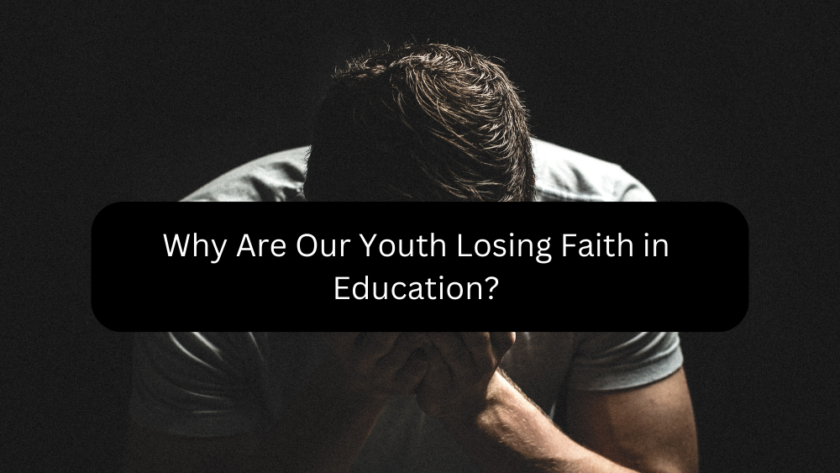What: This article explores the reasons why many young people are losing faith in education. It highlights various challenges and trends affecting youth’s perception of education.
Why: Education should be the light guiding our youth, not the shadow that makes them doubt. The goal is to figure out these problems and find better ways to make education fun and useful for young people.
In recent times, more and more people are starting to doubt the value of education. A lot of youth these days aren’t so sure about school. They think this kind of education doesn’t always teach them what they need to know in life. What’s even more concerning is that many youth are dropping out of school and have completely lost faith in the education system. School can be stressful, with too many tests and homework. Moreover, to get this type of education, you need to pay hefty amounts, especially if you apply to private schools and colleges. The declining quality of education in domestic medical schools has led many aspiring doctors to seek alternatives in Medical School Abroad. Some families and young people prioritise making money over education due to these factors. Although the world is changing rapidly, it feels like school is still doing things the same way it did a long time ago. But, are youths losing faith in education? You know, many youth still believe that education can be better and more helpful if it changes.
Statistics on Students Who Don’t Go to Schools

According to the National Center for Education Statistics (NCES), “in 2021, there were 2.0 million status dropouts between ages 16 and 24”. The overall status dropout rate decreased from 8.3 percent in 2010 to 5.2 percent in 2021. However, there is no updated information about students leaving schools or colleges from any trusted international educational organisations or government agencies in 2023.
Top 5 Reasons Why Our Youths Are Losing Faith in Education
It’s quite fascinating to see how the world of education is evolving. While observing the current state of education, I have noticed some significant changes. The decline in trust in educational institutions has led to a growing emphasis on self-directed career development and alternative learning pathways. I couldn’t help but get curious about how these things are affecting both you and me. Although a good education can potentially lead to better income. Many youths are more inclined to pursue money without prioritising a quality education. Here are six major trends that are adjusting our education system and why our youths are losing faith in education.
Lack of Relevance
1. Outdated Curriculum
You see, sometimes what we learn in school doesn’t match up with what the real world demands in jobs. We have been learning courses that were created two decades ago. It can be frustrating and make us wonder if we should pursue this kind of education or not.
2. Demand for soft skills
While we learn important stuff like maths and science, we also need soft skills like problem-solving and creativity. When school doesn’t focus on these, we feel less prepared for life’s challenges.
3. Twisted relation between Career and Job market
It’s like learning to drive a car, but the world is moving toward self-driving cars. Our education often lags behind what’s happening in the job market. Sometimes, what we learn in school doesn’t keep up with the current job scenario, and it makes us question if we are getting the right knowledge.
4. Rise of Automation and Artificial Intelligence
Technology is growing fast. I prefer the growth of AI and IT has been beneficial so far. But subconsciously, we still fear this might take our job, and the education we receive might not prevent this from happening.
5. Motivation and engagement
When we don’t see how our studies relate to our future, it’s tough to stay motivated. We start doubting if our hard work in school will pay off. Youth are often uncertain about whether they should consider themselves children or adults. This is especially influenced by the role played by social media in youthful minds. As a result, they tend to invest a lot of effort in their studies and exams while aiming for good grades, only to realise in the end nothing matters.
2. Economic Uncertainty
1. Student Debt
Student loans can weigh heavily on us. They make it tough to save money or hit life milestones like buying a home. The weight of these loans can also affect youth’s mental health, leaving them anxious about their future. And the stress it brings can make us wonder if our education is worth all that money.
2. Changing career Landscape
As technology evolves, some jobs are changing or even disappearing. Think of it like a fast river that’s always changing. We study to secure good jobs and have a healthy lifestyle, but the jobs we once considered safe may not be available in the future. This uncertainty can shatter their trust in what they are truly studying for.
3. Uncertain Job Prospects
Even with a degree, finding a job that fits what we have learned can be tricky. Why spend 20 years getting degrees if they don’t lead to the job we want? As youth’s fiery spirits grow during their teenage years, these experiences can shape how they view the education system.
4. Financial Barriers
If your family isn’t well-off, paying for college can seem impossible. It’s like trying to climb a steep mountain. Young people often start to feel that they have had enough education because they are not getting much in return. So, why invest in higher education? It’s really sad when students have to quit college because the tuition fees are just too high.
Read: Exploring Different Learning Styles: Finding What Works for You
3. Pressure and Stress
1. Competitiveness
Life can often feel like a big race where everyone is trying to be the best. When you believe you are good at something, there is always someone who can outsmart you. This thing is like a never-ending contest that can make us feel overwhelmed and anxious. It’s always true that you have to be perfect.
2. Parental pressure
Our parents love us and want the best for us, but sometimes they can put a lot of pressure on us. In most Asian countries, if you don’t have good grades parents will often create drama regarding your studies. The burden of securing good marks and landing a career that satisfies your parents often feels like a heavy weight on our shoulders. We don’t want to disappoint them, and it can create stress and tension in our relationship.
3. Lack of coping skills
Sometimes, life throws tricky problems at us, and we don’t know how to handle them. It’s like trying to solve a puzzle without the instructions. This can make us feel frustrated and unsure about how to deal with life’s challenges.
4. Fear of Failure
Imagine being terrified of making mistakes. We are afraid to try new things because we worry about getting things wrong. If students perceive the education system as judgemental, they lose faith in education. It makes them feel like they can’t succeed. Moreover, they worry that people might judge them as failures because of low marks or failing exams.
5. Peer Relationship
Our friends and the people we hang out with are super important. Sometimes, students face bullying or harassment in class. They fear that returning to class may result in further bullying from peers. It can be tough to rebuild your confidence when you have low self-esteem.
4. Technological distraction
1. Multitasking
Ever tried to do too many things at once, like texting while studying? It can be frustrating and make us doubt if we’re any good at learning because we might not do either task well.
2. Reduce engagement
Imagine being more into your phone or social media than the lesson. It may not seem like a big deal, but it can lead to a decreased interest in studying. You watch all those fun videos on the internet. However, studying isn’t as enjoyable as watching your favourite actor get pranked by random YouTubers. “Engaging with the internet is similar to being addicted to drugs– you never get bored of it.”
3. Social Comparison
We often post our good academic results, and don’t get me wrong, it’s great to share our achievements. However, those who receive lower marks and see specific posts from friends who have done well may indeed lose faith in education.
5. Inequality in Education
1. Limited access to quality education
Not all schools are the same. Some have better resources, like books and technology, while others don’t. One is getting all those necessary materials while another is getting none. It simply leads to negative thoughts, making youths feel education isn’t fair.
2. Teacher Quality
Teachers make a big difference. But in some places, it’s tough to find really good teachers. I suffered from having bad teachers, back then in high school I used to love financial management. But, the way the teacher taught that subject made me feel like it was tough and not for me. These things suck and can make us doubt the education system. As a result, we find ourselves on our own, trying to pursue what truly makes us happy.
3. Standardised test gaps
We all have to take tests in school. However, some students may need extra help to get ready for these tests, while others don’t. These standardised tests only evaluate students’ memory power rather than having a better future in the real world.
4. Racial and ethnic gap
In some areas, students from different backgrounds might not get the same chances for a good education. They are sometimes perceived as marginalised by society, and investing in their education is sadly seen as a waste.
The Importance of Education for Youths
Education is like a precious gift for those who dream of embracing it. These days education consists of various learning styles not solely confined to reading books and memorising facts. .But, youths are not understanding the value of education. They think reading books and facts is the only source of knowledge, which is completely false. This thing is not limited to just books and facts; it’s about making us clever and creative. With education, you get to understand the world better, and you can say what’s on your mind. It’s where you find out what you love and gain the confidence to go after it. It’s often said that ‘a little knowledge is dangerous,’ but having zero knowledge can be even scarier. So, keep going, education is about making the whole world a brighter and better place for everyone who can recognize their true abilities and creativity. Education will certainly be valuable while solving problems, fostering creativity, and understanding what’s happening around us.
Wrapping Up
The reasons some of us young people lose faith in education can be different. Learning can sometimes feel boring, and not everyone feels pleased while studying. Youth often study to secure better job positions, so if someone isn’t sure about their future job prospects why should they dedicate their life to studying? What’s even more frustrating is that during the learning phase not everyone has access to the best resources, and money can be a problem. The college search process has become a daunting task for many students, as rising tuition costs and uncertain job prospects erode their faith in the value of higher education. Although it seems unfair to see others with access to proper resources while you have limited access. There is so much pressure to be perfect and the competition is high. Plus, it’s hard to stay focused with our phones and games. But if we want to love learning again, we need to make education more exciting and helpful for everyone. We should listen to what each of us needs, make learning fun, and get ready for the future. That way, we will remember how fun education can be.
We at GeneralEducator, aim to provide the best education plans. Our website assures that you should have a one-of-a-kind plan that actually works. For more informative content, keep following us.
FAQs
How to encourage kids without pressuring them?
Encouraging kids without pressuring them is a delicate balance that can maintain a healthy relationship with learning. Here are some tips that you might want to consider:
- Create a supportive environment
- Emphasise learning, not grades
- Provide choices
- Reward small achievements
- Avoid over-scheduling
- Open communication
How can personalization in education change youth perspectives on education?
Here is how personalization in education can have an impact on changing youth perspectives on education:
- Increased Motivation
- Confidence building
- Reduce overtime and pressure
- Increased engagement
- Ownership and Empowerment
Author’s bio:
Rose is a successful writer and a content professor. She loves sharing her deep understanding of content marketing. Her specialty is creating easy-to-understand materials that help people grasp the ins and outs of content marketing effortlessly.
Beyond her work, she enjoys swimming and cycling in her free time. Jane has also written many outstanding guest and service blogs and has made valuable contributions to trusted CDR report writers.




